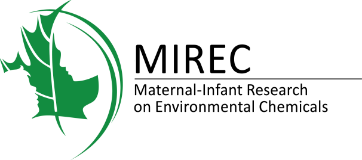
# 142
Prenatal Concentrations of Perfluoroalkyl Substances and Maternal Beta Cell Function at 7 to 9 Years of Follow-Up
Lay Summary Article PDF
2025
Journal:
Journal of Clinical Endocrinology and Metabolism
# 141
Urinary Iodine Concentration and Thyroid Hormone Metabolism in Pregnant Women and Neurodevelopment in Their Children: A Longitudinal Canadian Birth Cohort
Lay Summary Article PDF
2025
Journal:
Nutrients
# 140
Prenatal PFAS exposures and cardiometabolic health in middle childhood in the MIREC cohort
Lay Summary Article PDF
2025
Journal:
Environmental Research
# 139
Prenatal exposure to solvents and fetal outcomes in a Canadian pregnancy cohort
Lay Summary Article PDF
2025
Journal:
International Journal of Hygiene and Environmental Health
# 138
Gestational exposure to environmental chemical mixtures and cognitive abilities in children: A pooled analysis of two North American birth cohorts
Lay Summary Article PDF
2025
Journal:
Environment International
# 137
The Association Between Pregnancy Complications and Long-term Maternal Cardiometabolic Health in the MIREC Cohort Study
Lay Summary Article PDF
2025
Journal:
Journal of Clinical Endocrinology and Metabolism
# 136
Profiles and Predictors of Child Neurodevelopment and Anthropometry: The MIREC study.
Lay Summary Article PDF
2025
Journal:
Journal of Multimorbidity and Comorbidity
# 135
Personal care product use and per- and polyfluoroalkyl substances in pregnant and lactating people in the MIREC study.
Lay Summary Article PDF
2024
Journal:
Environment International
# 134
Combined Exposure to Folate and Lead during Pregnancy and Autistic-Like Behaviors among Canadian Children from the MIREC Pregnancy and Birth Cohort.
Lay Summary Article PDF
2024
Journal:
Environmental Health Perspectives
# 133
Concentrations and predictors of select nutrients in Canadian human milk samples from the MIREC pregnancy cohort.
Lay Summary Article PDF
2024
Journal:
The American Journal of Clinical Nutrition
# 132
Prenatal exposure to PFAS and the association with neurobehavioral and social development during childhood.
Lay Summary Article PDF
2024
Journal:
International Journal of Hygiene and Environmental Health
# 131
Gestational urinary concentrations of glyphosate and aminomethylphosphonic acid in relation to preterm birth: the MIREC study.
Lay Summary Article PDF
2024
Journal:
Journal of Exposure Science & Environmental Epidemiology
# 130
Performance of the Social Responsiveness Scale-2 for the Assessment of Autistic Behaviors in a Sample of Canadian Preschool-Aged Children.
Lay Summary Article PDF
2024
Journal:
Journal of Autism and Developmental Disorders
# 129
Vitamin D and Toxic Metals in Pregnancy - a Biological Perspective.
Lay Summary Article PDF
2024
Journal:
Current Epidemiology Reports
# 128
Gestational exposure to organochlorine compounds and metals and infant birth weight: effect modification by maternal hardships.
Lay Summary Article PDF
2024
Journal:
Environmental Health
# 127
Legacy halogenated flame retardants in Canadian human milk from the maternal-infant research on environmental chemicals study.
Lay Summary Article PDF
2024
Journal:
Journal of Environmental Exposure Assessment
# 126
Serum concentrations of legacy, alternative, and precursor per- and polyfluoroalkyl substances: a descriptive analysis of adult female participants in the MIREC-ENDO study.
Lay Summary Article PDF
2024
Journal:
Environmental Health
# 125
A cohort study of the multipollutant effects of PM2.5, NO2, and O3 on C-reactive protein levels during pregnancy.
Lay Summary Article PDF
2024
Journal:
Environmental Epidemiology
# 124
Prenatal Exposure to Air Pollution and Respiratory Distress in Term Newborns: Results from the MIREC Prospective Pregnancy Cohort.
Lay Summary Article PDF
2024
Journal:
Environmental Health Perspectives
# 123
Fluoride exposure and thyroid hormone levels in pregnancy: The MIREC cohort.
Lay Summary Article PDF
2024
Journal:
Environment International
# 122
Maternal Exposure to Metals and Time-to-Pregnancy: The MIREC cohort study.
Lay Summary Article PDF
2024
Journal:
BJOG: An International Journal of Obstetrics & Gynaecology
# 121
Novel halogenated flame retardants in Canadian human milk from the MIREC study (2008-2011).
Lay Summary Article PDF
2024
Journal:
Chemosphere
# 120
Prenatal fluoride exposure, offspring visual acuity and autonomic nervous system function in 6-month-old infants.
Lay Summary Article PDF
2024
Journal:
Environment International
# 119
Cohort profile update: The Canadian Maternal-Infant Research on Environmental Chemicals Child Development study (MIREC-CD PLUS).
Lay Summary Article PDF
2023
Journal:
Paediatric and Perinatal Epidemiology
# 118
Childhood exposure to pyrethroids and neurodevelopment in Canadian preschoolers.
Lay Summary Article PDF
2023
Journal:
Neurotoxicology
# 117
A descriptive analysis of first trimester urinary concentrations of 14 bisphenol analogues in the MIREC Canadian pregnancy cohort.
Lay Summary Article PDF
2023
Journal:
International Journal of Hygiene and Environmental Health
# 116
Prenatal exposure to perfluoroalkyl substances and inflammatory biomarker concentrations.
Lay Summary Article PDF
2023
Journal:
Environmental Epidemiology
# 115
Measurement of 24 phthalate metabolites in 1st trimester urine samples: The MIREC Study.
Lay Summary Article PDF
2023
Journal:
Chemosphere
# 114
Prenatal and concurrent blood mercury concentrations and associations with IQ in Canadian preschool children.
Lay Summary Article PDF
2023
Journal:
Environmental Research
# 113
Prenatal Exposure to Legacy PFAS and Neurodevelopment in Preschool-Aged Canadian Children: The MIREC Cohort.
Lay Summary Article PDF
2023
Journal:
Neurotoxicology and Teratology
MIREC Année all rights reserved - Privacy policy
Website by Riposte


